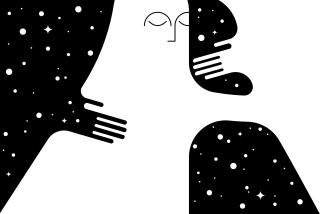THINKING IN THE SHADOW OF FEELINGS A New Understanding of the Hidden Forces That Shape Individuals and Societies<i> by Reuven Bar-Levav (Simon & Schuster: $19.95) </i>
- Share via
In this crazy quilt of a book, the author sets forth “a new theory of human motivation and behavior” to explain everything from overpopulation and international terrorism to love, fear and sex. Not surprisingly, the theory is neither new nor rigorous enough to demystify the more vexing maladies of modern life. “Thinking in the Shadow of Feelings” is intriguing, though, for it is audaciously, eccentrically anachronistic. While psychiatry is now moving toward more precise, drug-based treatment and psychology toward more short-term, practical, “cognitive” therapies, Reuven Bar-Levav offers the kind of free-roaming, idealistic inquiry that went out with Erich Fromm and Abraham Maslow in the 1960s.
The theories of Bar-Levav are as highly debatable as they are provocative. They begin, appropriately enough, with the newborn infant. Unable to make sense of its new world, Bar-Levav writes, the infant feels “a sense of dread, impending doom in the face of the unknown.” Our attempts to deny this early fear during adulthood explain a host of modern neuroses, Bar-Levav believes, such as our reluctance to admit our dependency on others. Bar-Levav’s theories can be criticized in many ways: for one, several books published recently, such as “World of the Newborn” (Basic), demonstrate the unlikelihood that babies experience emotions as complex as dread.
Many of the author’s ideas seem less credible than they actually are, however, for Bar-Levav never lands on one topic long enough to build a rhetorically strong thesis. Typical is a passage which argues against resuscitating infants who have little chance of surviving. Bar-Levav wins us over to his side by describing the case of an infant who ran up $100,000-plus hospital bills, but then undermines his argument by moving on to other topics without addressing thornier questions about infant health care, such as how we should determine when to pull the plug.
More to Read
Sign up for our Book Club newsletter
Get the latest news, events and more from the Los Angeles Times Book Club, and help us get L.A. reading and talking.
You may occasionally receive promotional content from the Los Angeles Times.










